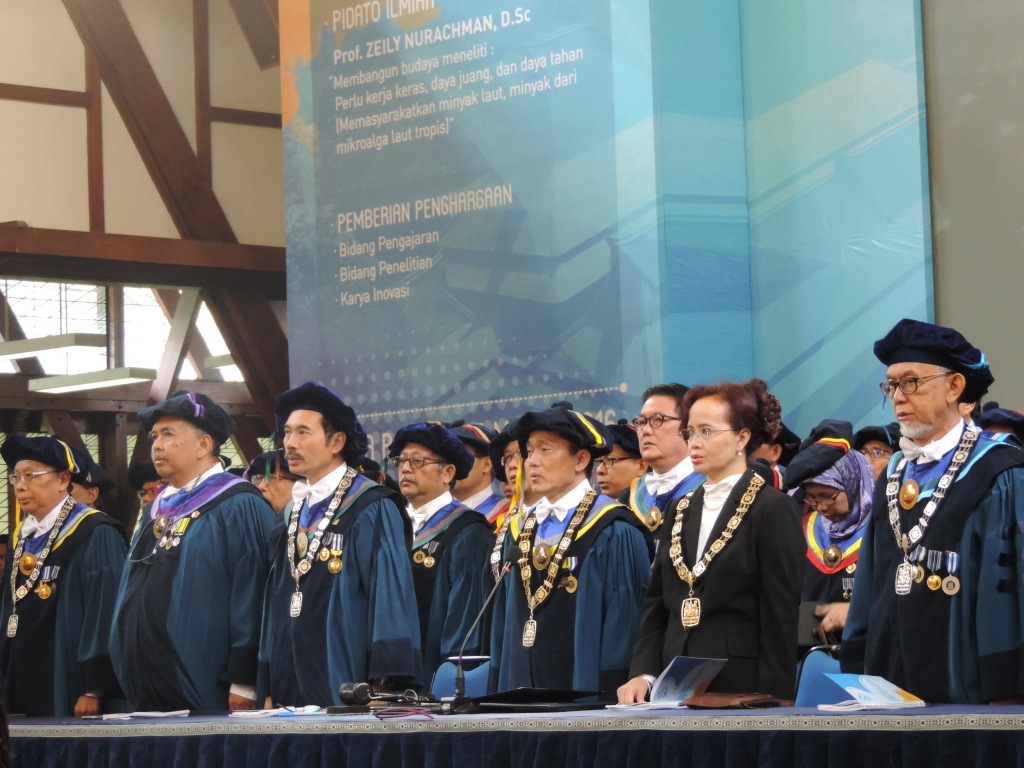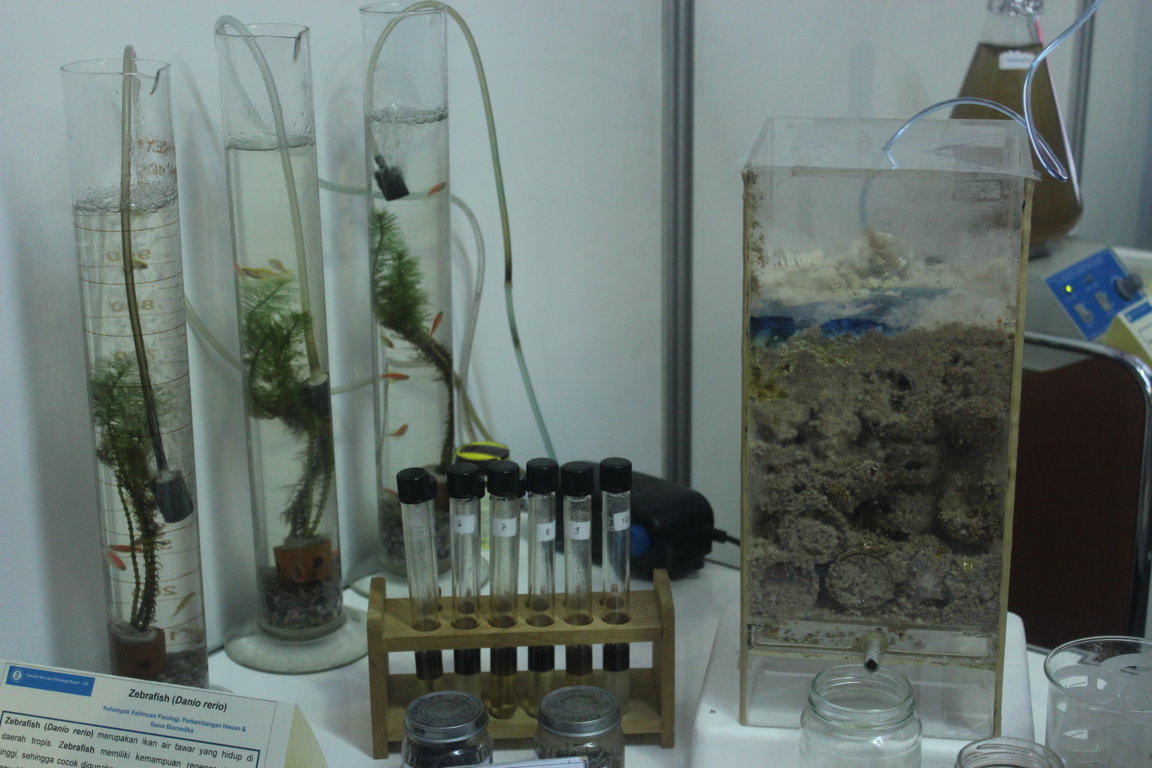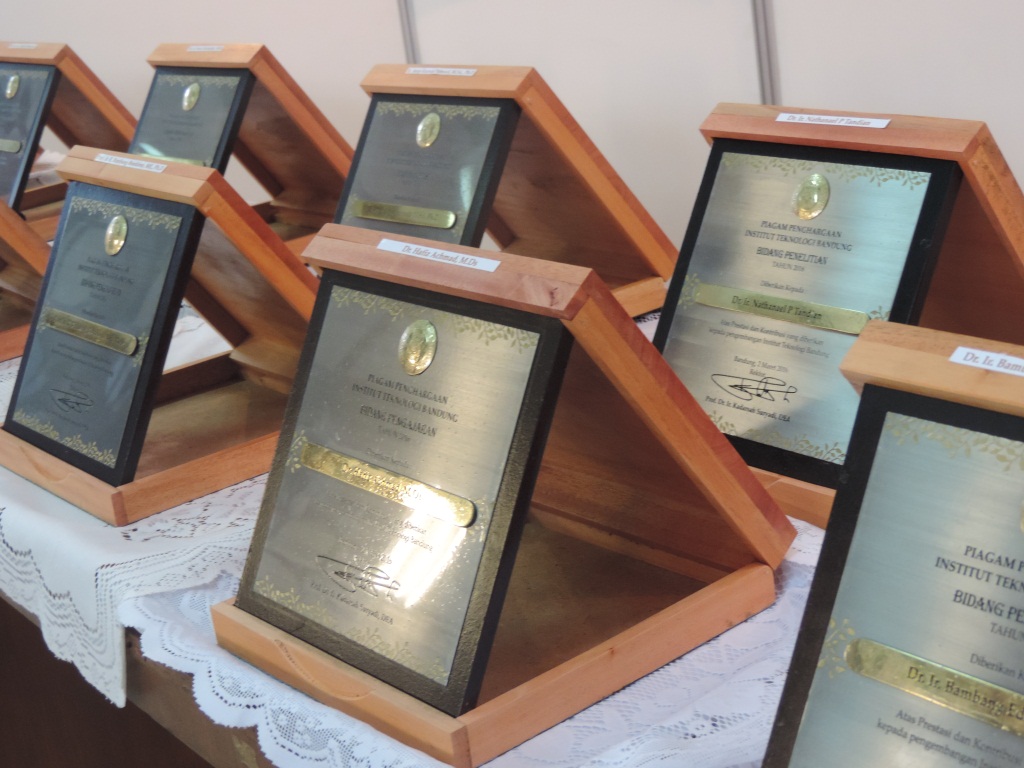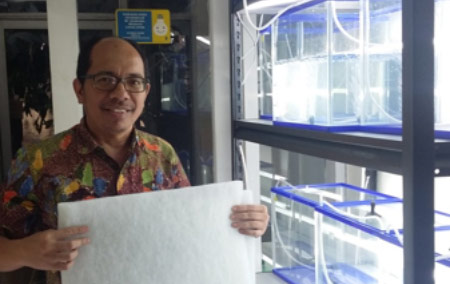ITB Contribution in Biochemistry Exploration and Innovation Put an End to Nation's Problems
By Cintya Nursyifa
Editor Cintya Nursyifa

 BANDUNG, itb.ac.id - ITB with all of its academics successfully reproduces the diversity of innovation in solving various problems in the country through biochemistry. This was revealed in a scientific speech of Prof. Zeily Nurachman, D.Sc of Biochemistry ITB entitled "Building a Culture Researching: Need to Work Hard, Fighting Power and Endurance (Popularizing Sea Oil, Oil of Tropical Marine Microalgae)" presented in open session the 57th Anniversary of ITB on Wednesday (02/02/16).
BANDUNG, itb.ac.id - ITB with all of its academics successfully reproduces the diversity of innovation in solving various problems in the country through biochemistry. This was revealed in a scientific speech of Prof. Zeily Nurachman, D.Sc of Biochemistry ITB entitled "Building a Culture Researching: Need to Work Hard, Fighting Power and Endurance (Popularizing Sea Oil, Oil of Tropical Marine Microalgae)" presented in open session the 57th Anniversary of ITB on Wednesday (02/02/16).  As a form to relate, Zeily also had cooperation with foreign parties such as the German Cancer Center (DKFZ, Heielberg, Germany) and the University of Groningen (RUG) Netherlands. Among these studies, Zeily raised the topic of research on flavonoids artoindonesianin, the findings of Organic Natural Products Chemistry Group under the leadership of Prof. Syamsul A. A. These compounds may reduce cancer risk. Working closely with Dr. Marselina (Physiology, Development of Animal and Biomedical Sciences School of Life Sciences) and Dr. Rukman Hertadi (Biochemical Sciences) study the dynamics of interaction between ligand molecules (flavonoids) and the target protein (kinase A) is successful. That study used the database to identify appropriate target protein. The data base system centered in Biochemistry ITB under the name ID3 (Indonesia Drug Discovery Database) that is open to development.
As a form to relate, Zeily also had cooperation with foreign parties such as the German Cancer Center (DKFZ, Heielberg, Germany) and the University of Groningen (RUG) Netherlands. Among these studies, Zeily raised the topic of research on flavonoids artoindonesianin, the findings of Organic Natural Products Chemistry Group under the leadership of Prof. Syamsul A. A. These compounds may reduce cancer risk. Working closely with Dr. Marselina (Physiology, Development of Animal and Biomedical Sciences School of Life Sciences) and Dr. Rukman Hertadi (Biochemical Sciences) study the dynamics of interaction between ligand molecules (flavonoids) and the target protein (kinase A) is successful. That study used the database to identify appropriate target protein. The data base system centered in Biochemistry ITB under the name ID3 (Indonesia Drug Discovery Database) that is open to development.
Solutions for Food, Health, Environment, and Energy-based Biochemistry
 With the spirit of independence that is implanted ITB from generation to generation, Zeily advised, "We need to build reactors our own, and do not be shackled by shortages and unavailability of equipment or budget to do research." Initially, Zeily researching coelomic fluid on earthworms (Lumbricus and Pheretima) acting as hydroskeleton and has the potential to be a fibrinolytic enzyme to thin blood clots in humans. This research, which was conducted in 2000 was able to give solution to prevent stroke. Each individual generally has a natural activator of blood thinners, namely plasminogen/urokinase which decreases with age. This natural activator needs to be expected with a liquid silom missed working with a specific protease activity of fibrin fibers crusher in a matter of minutes can thin the blood clot is frozen. Activities studies were published in international journals with a 100% work of local researchers.
With the spirit of independence that is implanted ITB from generation to generation, Zeily advised, "We need to build reactors our own, and do not be shackled by shortages and unavailability of equipment or budget to do research." Initially, Zeily researching coelomic fluid on earthworms (Lumbricus and Pheretima) acting as hydroskeleton and has the potential to be a fibrinolytic enzyme to thin blood clots in humans. This research, which was conducted in 2000 was able to give solution to prevent stroke. Each individual generally has a natural activator of blood thinners, namely plasminogen/urokinase which decreases with age. This natural activator needs to be expected with a liquid silom missed working with a specific protease activity of fibrin fibers crusher in a matter of minutes can thin the blood clot is frozen. Activities studies were published in international journals with a 100% work of local researchers.
Furthermore, Zeily also had held researchs with colleagues at ITB like Drs. Sarwono Hadi, Dr. Dessy Natalia and other universities, who managed to deliver innovation in the textile processing with enzymes amylase to maximize the absorption of color in the yarn. Amylase can also be used as agents maker modified cassava flour and starch is modified cassava flour and starch (mocaf and mosaf) are useful in the field of food and health. The innovation patent has been registered through the IP office of ITB.
 By becoming an expert, it is appropriate to apply theoretical knowledge in real life problems. By finding that the impact of smog that hit Riau and surrounding areas, Zeily designed Bunker Smoke Protection evaluated directly by the President. Zeily had an unexpected experience when his ideas of using filter aquarium filter to stem smog and aquarium microalgae as an oxygen generator that was written in various media can be realized within three days. The system was considered effective and efficient so it was applied in the "Smoke Safe School System" to Java island, and in turn, used in homes and other public facilities. Completion of this system finally equipped with smog early detection.
By becoming an expert, it is appropriate to apply theoretical knowledge in real life problems. By finding that the impact of smog that hit Riau and surrounding areas, Zeily designed Bunker Smoke Protection evaluated directly by the President. Zeily had an unexpected experience when his ideas of using filter aquarium filter to stem smog and aquarium microalgae as an oxygen generator that was written in various media can be realized within three days. The system was considered effective and efficient so it was applied in the "Smoke Safe School System" to Java island, and in turn, used in homes and other public facilities. Completion of this system finally equipped with smog early detection.
Armed with a variety of research experience, Zeily fielded new topic that is the exploration of renewable fuel sources (biofuels) of tropical marine microalgae Indonesia. The fuel was popularized as the sea oil in a mass media. This research combines the ideas of Dra. Lily Maria G. P (Research Center for Oceanography LIPI) and Dr. Gede Suantika (Biotechnology Microbiology SITH). Sea oil from algae is not a rival for food oil. Prof Zeily and team wrote in the Bioresource Technology journal that said planting tropical marine diatoms in Olympic swimming pool (50m x 25m x 2m) can produce five barrels of sea oil per day. Indonesia has a tropical marine microalgae oil-producing marine diatom group. This is supported by the long coast of Indonesia which holds a potential for the cultivation of marine microalgae for 20,000 km with a width of 1 km coastline (10% -11% of the size that can be achieved) alone, at least provided an area of 2,000,000 hectares. With regard to the productivity of algae in the field as 10% of the conditions in the laboratory, a total of deepwater oil production as much as 120 billion liters per year, or 2 million barrels per day, was obtained. This figure is more than enough to meet the fuel needs for now and the next 20 years.
"In the spirit of independence and sovereignty in energy sector, intentions have been set traight. There is no choice but to go forward in order to face all challenges. As the proverb of the Bugis community-Society: "Once sails have risen, we shall not return to the beach" and also Chinese saying: "The long journey begins with one step". I pray that God Almighty grant the wishes of our ideals," concludes Zeily.

.jpg)
.jpg)
.jpg)
.jpg)
.jpg)


.jpg)